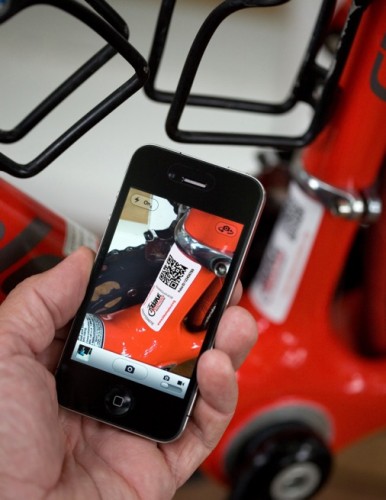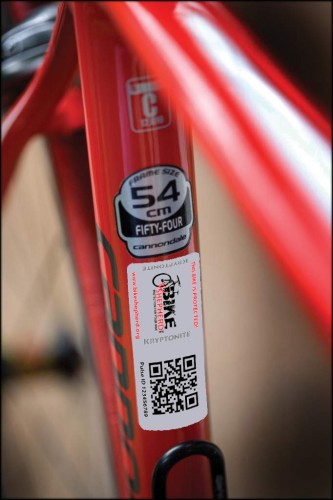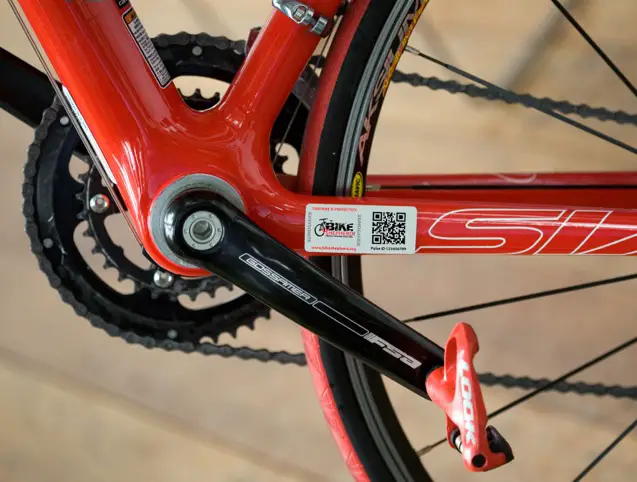We’ve got a great deal for new subscriptions: if you subscribe now you’ll receive a free Bike Shepherd Bike ID Kit worth £9.99.
The Bike ID kit comes supplied with a pack of three Pulse ID tags to identify your bike and help aid its recovery if the worst happens and it’s stolen.
Subscribe to Singletrack and get a free gift..

Want to now about Bike Shepherd and how it works? We asked Briand Beausoleil of Bike Shepherd to tell us a bit more about bike theft, security and how you can protect your bike.
Bike Theft: Three Ways to Beat The Thief & Increase Your Chances of Getting Your Stolen Bike Back
(Or Not Getting It Stolen In The First Place)
With the summer over, it was time to take stock of who the winners were in the relentless bike theft wars. Our team at Bike Shepherd headquarters put together a some interesting facts about bikes that were stolen over the summer of 2012.
Between May and September 2012, 1554 bikes were stolen that were registered with Bike Shepherd. These were broken down into three categories:
- Unregistered & untagged bikes where the owner registers the bike with Bike Shepherd after the bike was stolen
- Bikes registered with Bike Shepherd but not tagged with Pulse ID tags
- Bikes registered with Bike Shepherd and tagged with Pulse ID tags
Of the 1554 bikes stolen, 2% or 49 were returned to their rightful owner. At first glance, this may look like a low recovery rate.
However, of all bikes stolen, some were unregistered and therefore harder to trace, while others were just registered but not tagged. Both of these would keep recovery rates on the low side.
In addition, there’s no way to know how many owners of recovered bikes don’t report their recovered bikes to Bike Shepherd, which would also keep the recovery stats lower than normal.
What we do know is registered but untagged bikes drive two things – higher theft rates and lower recovery
1 Higher theft rates; high because the thief doesn’t know the bike is registered because there’s no tag and he steals it instead of moving on to easier prey;
2 Lower recovery rates; low because the police or Good Samaritans don’t know see a tag to check the bike in the first place to see if its stolen, and if so, alert the owner of its whereabouts.
In the third scenario, where a bike is registered and tagged, the real winners are the owners who had bikes registered and tagged with Bike Shepherd Pulse tags. Recovery rates were so high we had to double-check our figures! Of the 49 bikes recovered in our summer statistics, every one was registered and tagged with Bike Shepherd Pulse ID tag, which amounts to a 100% recovery rate.
It makes sense. The scannable Pulse ID tags from Bike Shepherd provide instant confirmation to the police or Good Samaritans of the bike’s status – stolen/not stolen. The person can then send a message to the owner right from their phone.
There are a number of reasons why people are successful in recovering their bikes; many follow our Top Ten List To Recover Your bike http://www.bikeshepherd.org/stolen-bike-recovery.html to good effect, others find them on Gumtree or eBay or get the word out to their local neighbourhood through our social media network.
However, the biggest reason people are reunited to their bikes is because once the police have found a suspicious or abandoned bike with a Bike Shepherd tag, they can contact the owner by scanning the tag or running the serial number through known bike registry databases such as Bike Shepherd. If an owner is registered with Bike Shepherd, there’s a much higher chance the police will be able to contact you to return your bike.

For police involved in anti-theft bike sweeps, scanning the tag alerts them if the person who is riding the bike is the rightful owner. If it’s stolen, they can make an arrest, recover the bike and contact the owner at the same time.
This is a crucial issue for police who traditionally don’t view bike theft as a high priority crime because so many of the bikes they check are unregistered and therefore untraceable. Unless the police can verify proof of ownership, they’re reluctant to prosecute the thief. This situation offers little incentive to a harried cop who’s is under pressure to invest in police activities that result in convictions.
Also, potential buyers of second-hand bikes can check provenance prior to buying, reducing their chances of buying stolen goods and possibly losing their money if the bike if found later to have been stolen.
Tagging your bike and registering it on a global database makes sense and is an affordable way to protect and recover your bike. It also deters theft in the first place as handlers, who buy dozens of stolen bikes every week from opportunistic thieves don’t want to risk holding traceable goods, so they’re less likely to buy a tagged bike from a thief.
To safeguard your bike, Bike Shepherd recommends first registering and tagging the bike then buy the best lock you can afford, at least a rated (8 or above) U lock and thick cable to lock your bike to an immovable object. Never leave your bike unlocked, even for an instant.
At home, put in an anchor bolt in your garage or shed and lock your bike to this. With a little common sense where you lock your bike, and certain precautions, you can keep yourself from being another bike theft statistic.
Bike Shepherd Bike ID Kits are available for £9.99 for a pack of three Pulse ID tags. For more information on how Bike Shepherd can help you keep your commuter, road or mountain bike safe, go to www.bikeshepherd.org. For information on how to recover your bike if stolen, go to http://www.bikeshepherd.org/stolen-bike-recovery.html.


